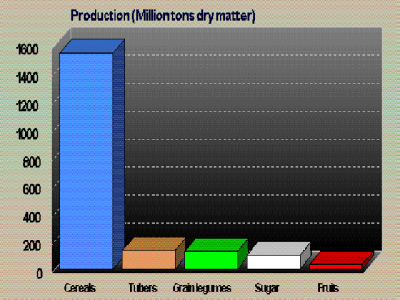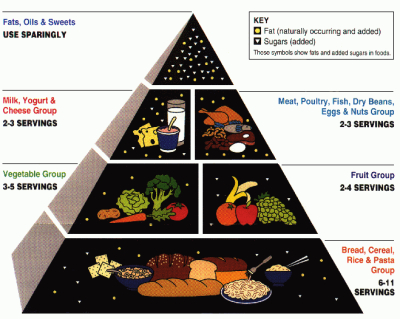
Processed foods and a grain-based diet
 Modern
agribusinesses are the clear descendants of an agricultural system that
gave rise to ill
health, poverty, and wars
of conquest.
I'm not
going to bore you with a rundown on how modern agribusinesses have
created environmental devastation, poverty in developing countries, the
demise of the small farmer, and yet more concentration of wealth in the
hands of a few --- I assume you've heard it all before. Instead,
I want to talk for a few minutes about the modern diet and processed
foods.
Modern
agribusinesses are the clear descendants of an agricultural system that
gave rise to ill
health, poverty, and wars
of conquest.
I'm not
going to bore you with a rundown on how modern agribusinesses have
created environmental devastation, poverty in developing countries, the
demise of the small farmer, and yet more concentration of wealth in the
hands of a few --- I assume you've heard it all before. Instead,
I want to talk for a few minutes about the modern diet and processed
foods.
Currently, twelve plant
species make up 80% of the world's crops by
weight --- wheat, corn, rice, barley, sorghum, soybeans, potato,
manioc,
sweet potato, sugarcane, sugar beet, and banana. Of those, the
big three are vastly dominant, and grains provide over half of the
calories for most people in the developing world. In the United
States, corn is king, and its derivatives can be found in nearly
every processed food on the supermarket shelves.

The current American
obsession with processed food can be traced back
to a Presbyterian minister named Sylvester Graham who preached a
message in keeping with the traditional Christian belief that
mortification of the body can elevate the soul. Graham advocated
vegetarianism, and pushed a particular cracker recipe so hard that it
now retains his name. Later advocates built on Graham's ideas and
argued that food is inherently dirty, having been grown in the
soil. Only by processing that food can we turn it into something
pure.
Agribusinesses took the
idea and ran with it. The market for
food was starting to butt up against its boundaries --- people can only
eat so much --- but processing that food turned it into a value-added
product that could be sold for more cash. The businesses marketed
processed food as a status symbol and time saver, and the American
public lapped up both the advertising and the corn syrup laden sodas.
 These
agribusinesses quickly discovered that they could grow far more
corn and wheat than Americans would willingly eat, so they turned to
the government for help. I grew up believing that the old USDA
food pyramid was gospel, but only recently did I realize that the USDA
has motives beyond making me healthy. With agribusinesses giving
huge donations to political leaders and those leaders funding the USDA,
it's no surprise that the food pyramid was used to tell Americans to
eat more of the foods we were growing in surplus --- grains.
During the Depression, our government even handed out two types of food
coupons; only after using the one for wheat and other surplus
commodities were Americans allowed to use the other and take home
fruits and vegetables.
These
agribusinesses quickly discovered that they could grow far more
corn and wheat than Americans would willingly eat, so they turned to
the government for help. I grew up believing that the old USDA
food pyramid was gospel, but only recently did I realize that the USDA
has motives beyond making me healthy. With agribusinesses giving
huge donations to political leaders and those leaders funding the USDA,
it's no surprise that the food pyramid was used to tell Americans to
eat more of the foods we were growing in surplus --- grains.
During the Depression, our government even handed out two types of food
coupons; only after using the one for wheat and other surplus
commodities were Americans allowed to use the other and take home
fruits and vegetables.
Given this history of
our spiritual leaders and government pushing
processed foods and grain-based diets, we shouldn't be surprised that
America is caught in the throes of an epidemic of obesity, especially
among the lower class where people have little choice but to accept the
government's handouts. But the sad truth is that for most of us,
eating processed foods is a choice. Every day, we make a decision
about what we want to eat --- will we turn vegetables and fruits from
the farmer's market or our garden into the modern incarnation of a
hunter-gatherer's diet, or will we pull out that frozen pasta alfredo
or stop by McDonalds for a Big Mac? I believe that we owe it to
ourselves to see past the marketing and be aware of what we lose by
buying into time-saving processed foods.
This post is part of our History of Agriculture lunchtime series.
Read all of the entries:
|
Want more in-depth information? Browse through our books.
Or explore more posts by date or by subject.
About us: Anna Hess and Mark Hamilton spent over a decade living self-sufficiently in the mountains of Virginia before moving north to start over from scratch in the foothills of Ohio. They've experimented with permaculture, no-till gardening, trailersteading, home-based microbusinesses and much more, writing about their adventures in both blogs and books.
Want to be notified when new comments are posted on this page? Click on the RSS button after you add a comment to subscribe to the comment feed, or simply check the box beside "email replies to me" while writing your comment.
- Remove comment

- Remove comment
- Remove comment
- Remove comment
